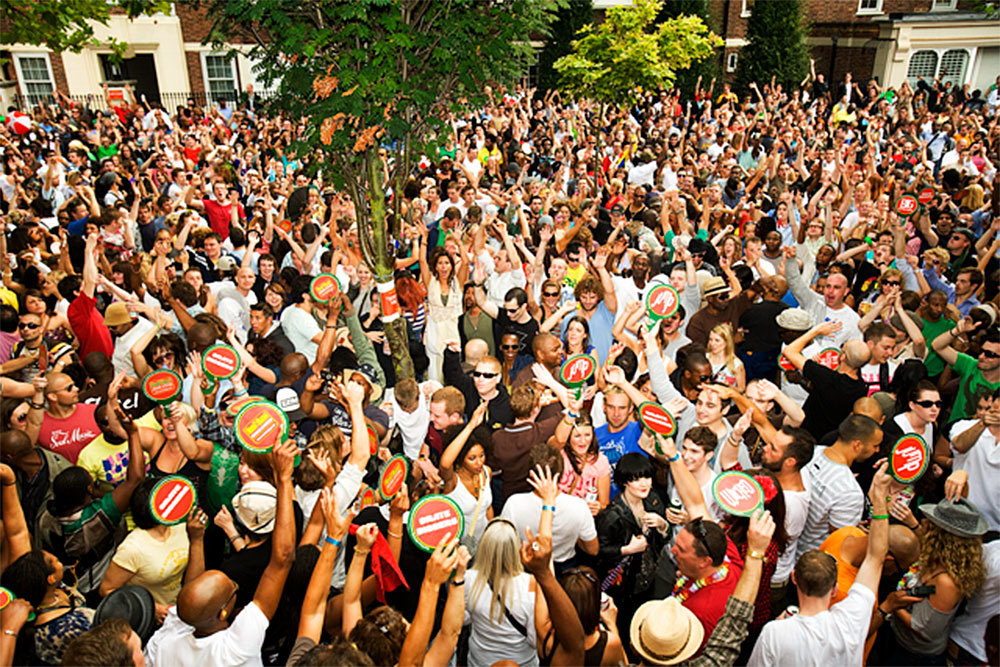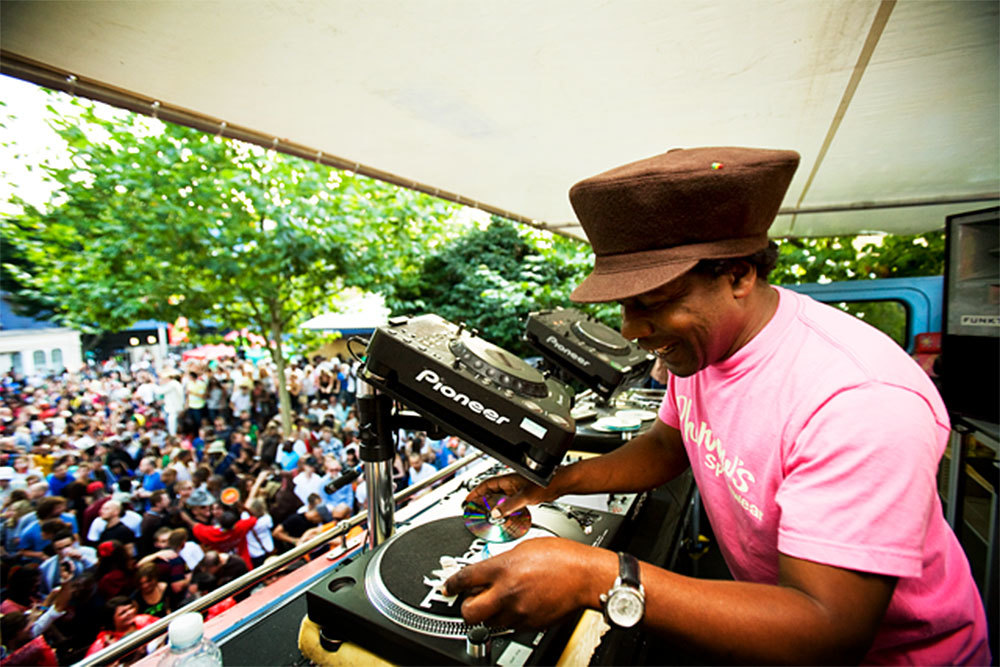“As an event, Carnival is unequalled. It’s the second largest free street festival in the world – certainly the biggest in Europe – and it’s the most inclusive, friendly, exciting, vibrant and creative. I’ve been privileged to be part of its history, first as a child, and latterly as a participant, for over 40 years.
As a kid, I was taken by family – or forced to go really in those days! It was a small, localised event then and mostly for the old folk from the old country, so to speak. I can only speak for myself, but being first generation born here in the UK, carnival had no real cultural significance or relevance to me at that time. I was born nearby, in the neigbourhhood when it was run down and a very socially deprived area. It was nothing short of a slum when I was a kid in the ‘Grove. But for my parents, and extended family, Carnival then was a big deal. It was a neighbourhood thing, a community thing. I can remember there would be Asian people, Irish, Spanish people there… it was a microcosm of multicultural London, long before it was recognised as such.
“The country was very politically charged then; you had the rise of the National Front, the police were no different to the old East Germany Stasi and they made us feel like we were living in a police state.”
I stopped going as a child when I didn’t have to go any longer, at the turn of the ’70s. I gave it a miss for four, five years but returned to it as a teenager, an angry young man in 1976, the year of the infamous riot there. The country was very politically charged then; you had the rise of the National Front, the police were no different to the old East Germany Stasi police and they made us feel like we were living in a police state. If you were a young, black youth in those days, the police were your sworn enemy – the army of the state, the state oppressors. That’s what we felt anyway. We resisted and good job we did too because as a result, laws were changed and relations between the youths and police improved. Carnival could get back to the business of showing the UK what it’s like to be Afro-Caribbean; the richness of our culture, our heritage, our food, our music, but at the same time being inclusive. Basically saying after all that’s happened, you can be part of this too, irrespective of whether you come from Africa, Europe or the UK.

But the riot did affect Carnival. It had been bubbling up for some time, and looking back, it was a confrontation that the-then government and the police perhaps wanted to happen. After that, in 1976, I didn’t go back for a couple of years. It was no place for me because the police would be looking for retribution and I didn’t want to become a victim of that. But there were other, exciting things happening around that time. The white working class kids created Punk, which was fantastic. Other working class factions were creating the second generation Rudeboy, you had the Mod thing coming out of Coventry, with Jerry Dammers and co. It showed us that spirit couldn’t be broken. White, working class kids in this country had a deep-seated affinity for black culture, particularly black Afro-Caribbean culture. We grew up on the same council estates, we ate the same food. No matter what the police or the state thought, they were never going to break that link. Look at bands like the Clash and the songs they were singing; look in the crowd and you saw black and white – Black and White Unite.
Back then, I had a fledging reggae sound system that my brother [Joey] built called Great Tribulation. It was very small, homemade, DIY, playing the local church and community halls around Acton, Shepherd’s Bush, Ealing and Ladbroke Grove. It took us a little while to make that step up into the big league i.e. bringing your Soundsystem to Carnival to play with the big reggae Soundsystems of the day. We aspired to be like them so it was life-affirming when we got there. It was one of those moments when we realised ‘Wow, we’re at Carnival’. We tried to go in 1979, but it was like the Wild West then, dog eat dog, You’d easily be run out by the bigger, older Soundsystem crew and we were just kids. But I’d been making plans and recce-ing where we would go, where we could get our power from. We made our debut there in August Bank Holiday, 1980.
“We did it for the love, from a passion and a tradition, it’s in our blood. It’s not and never has been a money thing, even though it becomes increasingly difficult to upkeep the tradition. If we die, then it’s conceivable this tradition dies with us…”
We stayed in our original location in Cambridge Gardens, during the bad old days of the Steamer gangs and the Westway Gangs but when they opened up the Carnival in 1990 and made it bigger, I was the first Soundsystem to opt out of being in the Central area. We moved to where everybody now knows and recognises us to be about a mile north from the epicenter, on the corner of Southern Row and West Row. When all of the other Soundsystems wanted to move closer to the epicenter, I wanted to move away from it. It turned out, as I knew it would be, the best move we ever made. We re-established ourselves there and, gradually, we established a crowd. It took us about three years to get up to capacity, but we did, because it was safe, we had lighting, people could enter and exit very easily and very quickly and, more importantly, very safely. In 32 years, we never had any issues or any trouble there. We never had a problem. Sometimes when Carnival was going a bit mad, it was all going on around us, but not where we where. And that added to our appeal. As some commentators pointed out, it was the first place where lots of non-black people began to come back to, after having been frightened off previously. I worked tirelessly in those days trying to change that negative perception. I was the man around town, out in clubland, I knew a lot of people, and in those early days, i-D played a great part, a pivotal role. i-D was one of the first magazines to recognise and acknowledge anyone involved in Notting Hill Carnival. It was so important in helping us to turn around a negative perception in 86, 87. i-D gave us a lot of support and coverage.
“It was the first place where lots of non-black people began to come back to… I worked tirelessly in those days trying to change that negative perception. In those early days, i-D played a great part, a pivotal role. i-D was one of the first magazines to recognise and acknowledge anyone involved in Notting Hill Carnival.”
I’m absolutely gutted that I’m not there this year, especially as it’s the 50th anniversary celebrations. Quite simply, it comes down to health and safety. Our site was being redeveloped; we’ve known that for some time. Being the biggest Soundsytem in Carnival, and that’s official, not just an idle boast – this is something we’ve been told by the police and the local authority. In order for us to operate safely, with all of that work going on, it restricted the space we could operate in. There were several health and safety concerns, mostly by the police, and the council weren’t really that helpful in trying relocating us. I’m confident that the council will work something out and we will be back. I have no doubt about that. So we’re thinking of it more as a hiatus, and rather than kicking our heels doing nothing, we’ve got the Good Times Festival kicking off with a fantastic line-up. It will be two weeks after Carnival, a standalone event where we can bring, safely, the Good Times Carnival experience to all of our crowd, all of our people, in a safe way.

We’re bowled over by the level of support we’ve had. This festival is a non-profit making Festival for the community and chosen charities. We won’t make a penny out of it. We’re not a corporate festival, we’re independent community based players with a face and a heart. We’re reflecting in a positive light what London is all about; style, music, fashion, vintage, art etc
We never received any funding or any help, financially, to do Carnival. Most people don’t know that. Everyone comes and enjoys Carnival, and where the Soundsystems are concerned, we finance it ourselves, out of our own pockets. We don’t get grants from the Arts Council or anything, because the perception of Carnival being a rogue event, a street event, an urban event. For whatever reason – political, racial – we were never able to attract any help with investment. Maybe that’s part of the appeal for the kids; it’s the last big, and the only free, rave in the country. We did it for the love, from a passion and a tradition, it’s in our blood. Any Soundsystem operator will tell you that. It’s not a money thing, even though it becomes increasingly difficult to upkeep the tradition. If we die, it dies with us. It’s a rich and creative culture and it’s played an integral part in the evolution of club culture and youth culture of the last 50 years.”
Good Times in the Park, with Chaka Khan, Groove Armada, Norman Jay, David Rodigan, Ms. Dynamite, Goldie, LTJ Bukem, Fabio & Grooverider and many, many more, takes place on 13 and 14 September at Wormwood Scrubs Park, London
Credits
Words Hattie Collins
